Unit 2 What time do you go to school? 知识点解析与练习 人教版英语七年级下册(无答案)
文档属性
| 名称 | Unit 2 What time do you go to school? 知识点解析与练习 人教版英语七年级下册(无答案) | 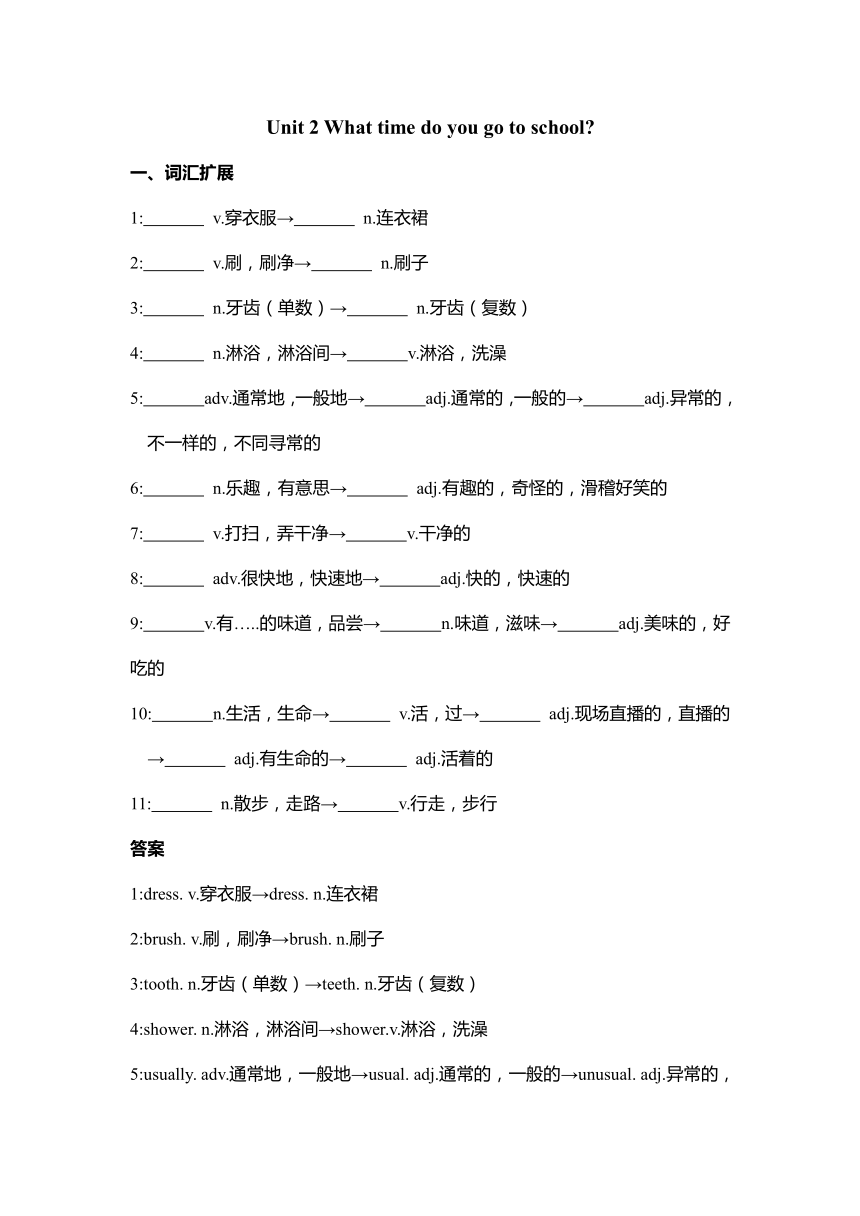 | |
| 格式 | docx | ||
| 文件大小 | 26.6KB | ||
| 资源类型 | 教案 | ||
| 版本资源 | 人教新目标(Go for it)版 | ||
| 科目 | 英语 | ||
| 更新时间 | 2024-03-02 09:37:18 | ||
图片预览

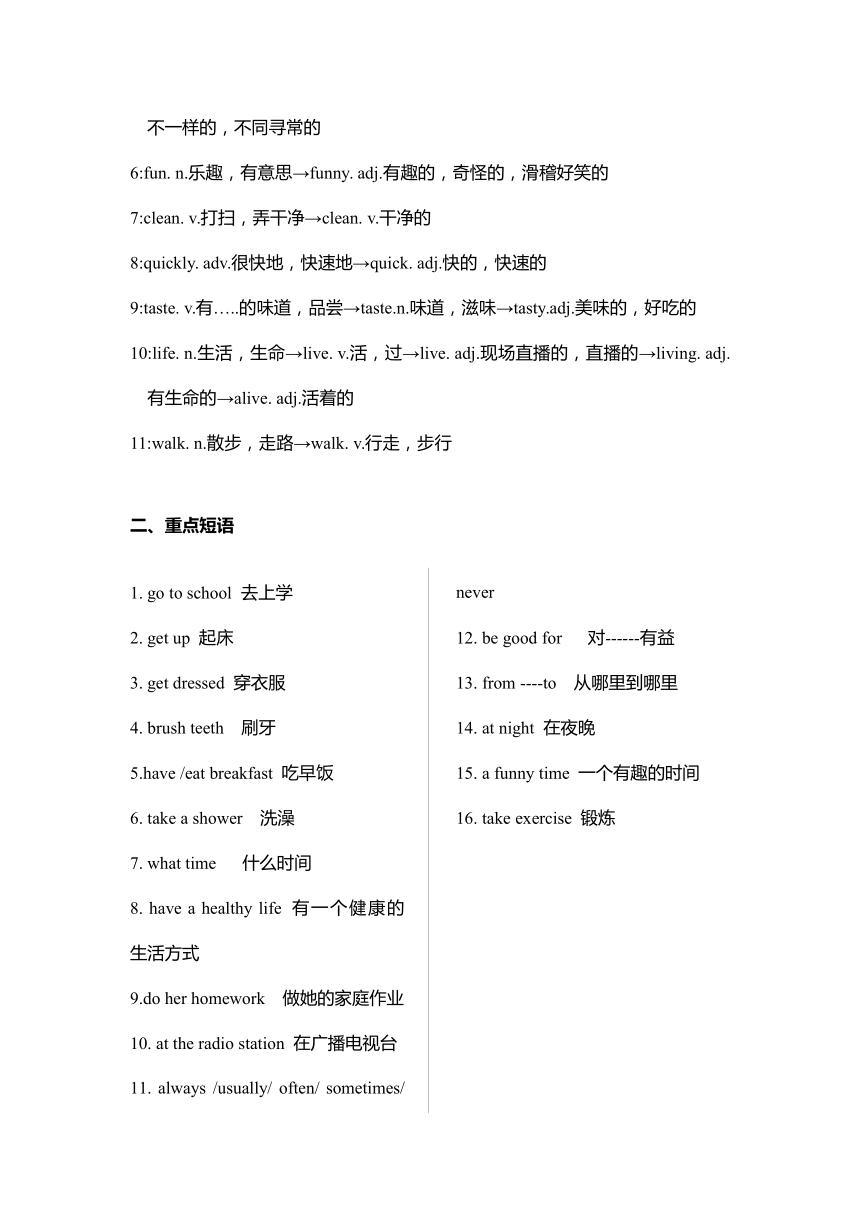
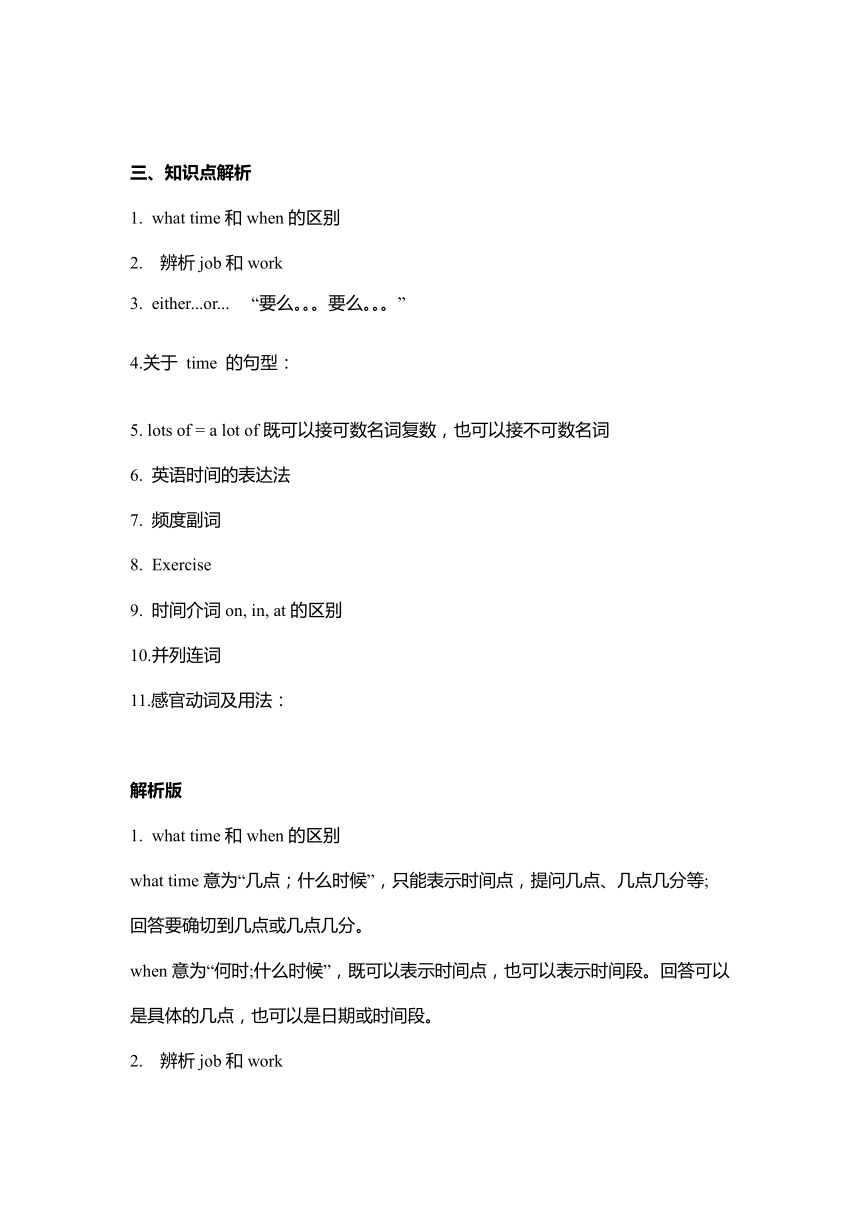
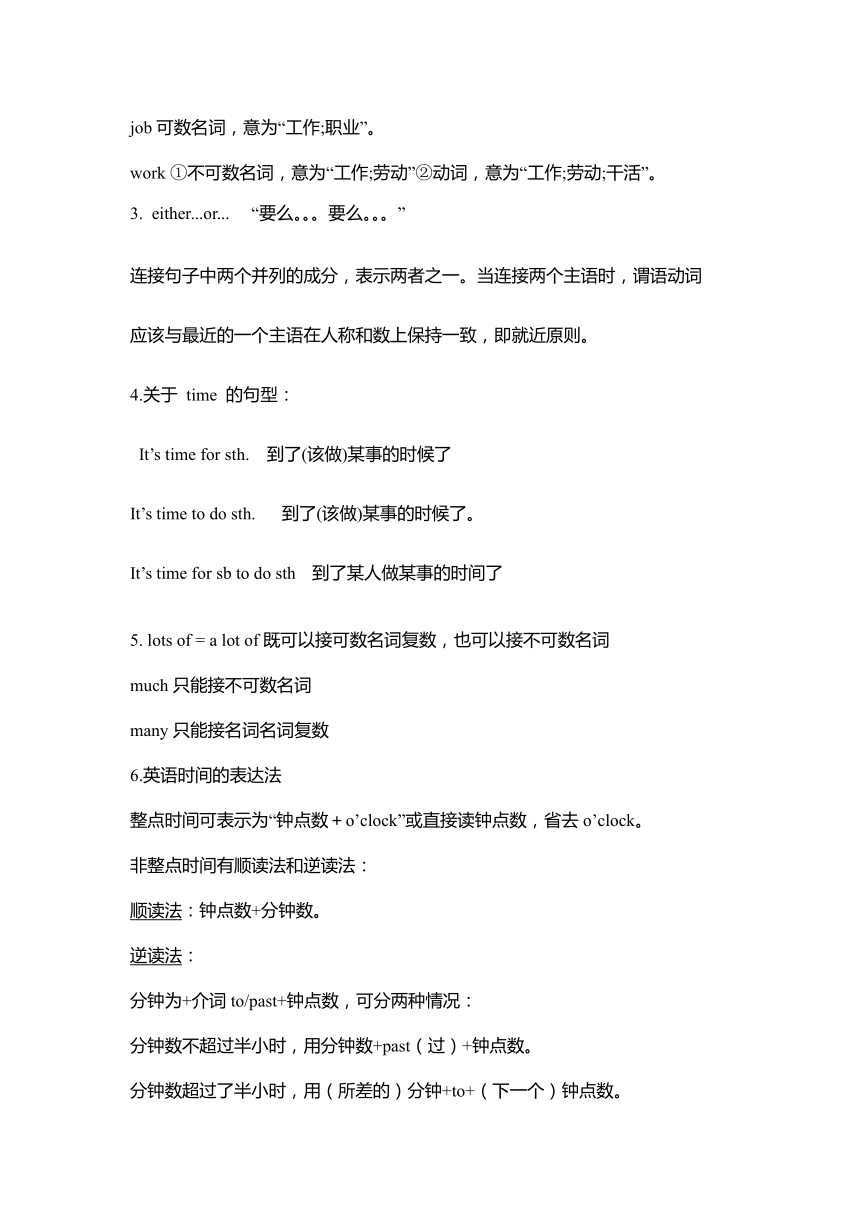
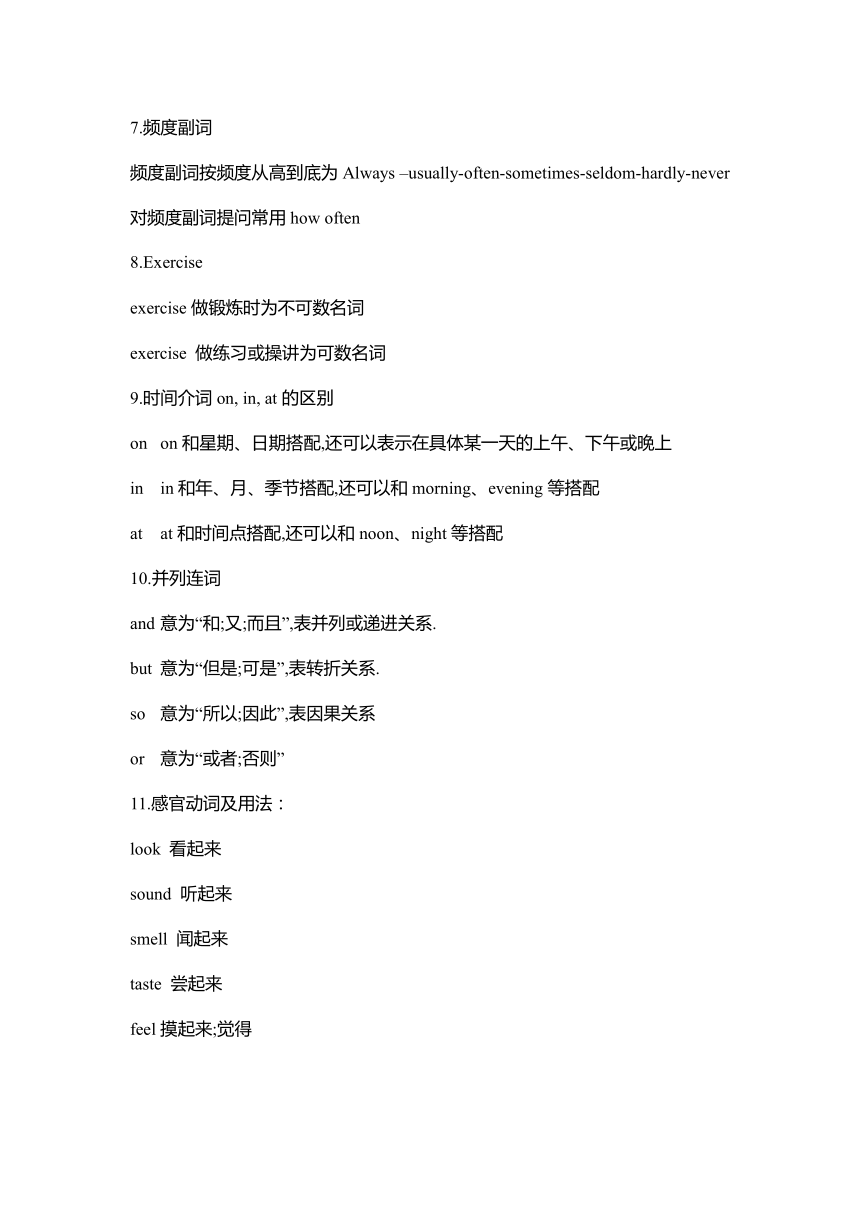
文档简介
Unit 2 What time do you go to school
词汇扩展
1: v.穿衣服→ n.连衣裙
2: v.刷,刷净→ n.刷子
3: n.牙齿(单数)→ n.牙齿(复数)
4: n.淋浴,淋浴间→ v.淋浴,洗澡
5: adv.通常地,一般地→ adj.通常的,一般的→ adj.异常的,不一样的,不同寻常的
6: n.乐趣,有意思→ adj.有趣的,奇怪的,滑稽好笑的
7: v.打扫,弄干净→ v.干净的
8: adv.很快地,快速地→ adj.快的,快速的
9: v.有…..的味道,品尝→ n.味道,滋味→ adj.美味的,好吃的
10: n.生活,生命→ v.活,过→ adj.现场直播的,直播的→ adj.有生命的→ adj.活着的
11: n.散步,走路→ v.行走,步行
答案
1:dress. v.穿衣服→dress. n.连衣裙
2:brush. v.刷,刷净→brush. n.刷子
3:tooth. n.牙齿(单数)→teeth. n.牙齿(复数)
4:shower. n.淋浴,淋浴间→shower.v.淋浴,洗澡
5:usually. adv.通常地,一般地→usual. adj.通常的,一般的→unusual. adj.异常的,不一样的,不同寻常的
6:fun. n.乐趣,有意思→funny. adj.有趣的,奇怪的,滑稽好笑的
7:clean. v.打扫,弄干净→clean. v.干净的
8:quickly. adv.很快地,快速地→quick. adj.快的,快速的
9:taste. v.有…..的味道,品尝→taste.n.味道,滋味→tasty.adj.美味的,好吃的
10:life. n.生活,生命→live. v.活,过→live. adj.现场直播的,直播的→living. adj.有生命的→alive. adj.活着的
11:walk. n.散步,走路→walk. v.行走,步行
二、重点短语
1. go to school 去上学
2. get up 起床
3. get dressed 穿衣服
4. brush teeth 刷牙
5.have /eat breakfast 吃早饭
6. take a shower 洗澡
7. what time 什么时间
8. have a healthy life 有一个健康的生活方式
9.do her homework 做她的家庭作业
10. at the radio station 在广播电视台
11. always /usually/ often/ sometimes/ never
12. be good for 对------有益
13. from ----to 从哪里到哪里
14. at night 在夜晚
15. a funny time 一个有趣的时间
16. take exercise 锻炼
三、知识点解析
what time和when的区别
辨析job和work
either...or... “要么。。。要么。。。”
4.关于 time 的句型:
5. lots of = a lot of既可以接可数名词复数,也可以接不可数名词
英语时间的表达法
频度副词
Exercise
时间介词on, in, at的区别
10.并列连词
11.感官动词及用法:
解析版
what time和when的区别
what time意为“几点;什么时候”,只能表示时间点,提问几点、几点几分等;
回答要确切到几点或几点几分。
when意为“何时;什么时候”,既可以表示时间点,也可以表示时间段。回答可以是具体的几点,也可以是日期或时间段。
辨析job和work
job可数名词,意为“工作;职业”。
work ①不可数名词,意为“工作;劳动”②动词,意为“工作;劳动;干活”。
either...or... “要么。。。要么。。。”
连接句子中两个并列的成分,表示两者之一。当连接两个主语时,谓语动词应该与最近的一个主语在人称和数上保持一致,即就近原则。
4.关于 time 的句型:
It’s time for sth. 到了(该做)某事的时候了
It’s time to do sth. 到了(该做)某事的时候了。
It’s time for sb to do sth 到了某人做某事的时间了
5. lots of = a lot of既可以接可数名词复数,也可以接不可数名词
much只能接不可数名词
many只能接名词名词复数
6.英语时间的表达法
整点时间可表示为“钟点数+o’clock”或直接读钟点数,省去o’clock。
非整点时间有顺读法和逆读法:
顺读法:钟点数+分钟数。
逆读法:
分钟为+介词to/past+钟点数,可分两种情况:
分钟数不超过半小时,用分钟数+past(过)+钟点数。
分钟数超过了半小时,用(所差的)分钟+to+(下一个)钟点数。
7.频度副词
频度副词按频度从高到底为Always –usually-often-sometimes-seldom-hardly-never
对频度副词提问常用how often
8.Exercise
exercise做锻炼时为不可数名词
exercise 做练习或操讲为可数名词
9.时间介词on, in, at的区别
on on和星期、日期搭配,还可以表示在具体某一天的上午、下午或晚上
in in和年、月、季节搭配,还可以和morning、evening等搭配
at at和时间点搭配,还可以和noon、night等搭配
10.并列连词
and 意为“和;又;而且”,表并列或递进关系.
but 意为“但是;可是”,表转折关系.
so 意为“所以;因此”,表因果关系
or 意为“或者;否则”
11.感官动词及用法:
look 看起来
sound 听起来
smell 闻起来
taste 尝起来
feel摸起来;觉得
练习
一、单项选择
1. Here are your clothes. ________ and we must go now.
A. Get dressed B. Make friends C. Play chess D. Speak English
2. — What do you often have for dinner
— Vegetables. We always eat ______ vegetables.
A. no B. all C. much D. lots of
3. — It’s seven _______ now.
— We only have ten minutes to get there. The party is at eight o’clock.
A. twenty B. thirty C. forty D. fifty
4. — Where is John
— He is in the playground (操场). He usually _______ at that time.
A. exercise B. exercises C. exercising D. to exercise
5. — How does Mr. White go to work
— ___________.
A. Good idea B. Thank you
C. He walks there D. You’re right
6.Tom usually ________ his teeth after ________. It is a good habit.
A.brush; eating B.brushes; eating C.brush; eats D.brushes; to eat
7.—Can you come here at a quarter ________ ten
—Yes, I can be there at 9:45.
A.past B.to C.after D.before
8.Either you or Mike ________ stories to us.
A.tell B.say C.tells D.says
9.I often have a ________ breakfast, but my teacher tells me eating ________ is not good for my health.
A.quick; quickly B.quick; quick C.quickly; quickly D.quickly; quick
10.I don’t have ________ homework to do now.
A.many B.a lot C.some D.lots of
二、完型
It is half past seven in the morning. Mr. Johnson is looking ____1____ his ____2____. He is ____3____ quickly. Then he is washing and ____4____. He is late as usual. So he doesn’t ____5____ time for breakfast. He is ____6____ all the way to the station and he arrives there just in time for the train. Mr. Johnson ____7___ eat anything in the morning. He always ____8____ a few friends at the office, “It’s nice to have ____9____ in the morning, but it’s nicer to ____10____ in the bed!”
1.A.at B.for C.after D.over
2.A.match B.window C.watch D.book
3.A.getting up B.going to bed C.sleeping D.having breakfast
4.A.dressed B.getting dressed C.dress D.putting on
5.A.has B.has got C.know D.have
6.A.walking B.running C.talking D.dancing
7.A.haven’t B.isn’t C.not D.doesn’t
8.A.says to B.talks C.says D.talks about
9.A.breakfast B.lunch C.tea D.bread
10.A.do exercise B.lie C.sleeping D.lying
三、用所给词的适当形式填空
1. What time ______ he usually ______(go) to bed
2. Scott______ (work) very long hours.
3. The food in the boxes _______(be) very delicious.
4. His parents usually_______ (get) up at five.
5. What about _______(listen) to the music.
6.Her aunt_________ (go) to work in the morning.
7.His family_________ (be) all teachers.
8.What time does he_________ (go) to bed
9.Please write and tell_________ (I) about your family.
10.We take a bus_________ (go) to school.
四、完成句子
1.在周末, 我要么做家庭作业要么打扫我的房间。
______ ______ ______, I ______ do my homework ______ clean my room.
2.我女儿喜欢牛奶和鸡蛋, 因为她知道它们对她有好处。
My daughter likes milk and eggs, because she knows they ______ ______ ______ her.
3.我的体育老师经常在早上五点做运动。
My P. E. teacher often ______ ______ at five in the morning.
4.她通常在下午5: 30回到家。
She usually ______ ______ at ______ ______ ______ in the afternoon.
5.我们的英语老师起得早, 而且早晨第一节课从未迟到过。
Our English teacher ______ ______ ______, and______ ______ late for the first class in the morning.
斯科特什么时候去上班?
_______ does Scott ______ ___ _______
我上班从不迟到。
I'm ______ ___ _______ work.
8.我没有太多的时间吃早饭,所以我通常吃得很快。
I ______ _______ much time for breakfast,so I usually ______ ___ _______.
放学后,我有时打半小时的篮球。
After school,I ________ play basketball for ______ ___ _______.
当我回到家时,我总是先做作业。
When I ______ _______,I always ______ ___ _______ first.
句型转换
1. My friend goes to bed at 9:00.(改为一般疑问句)
______ your friend _______ to bed at 9:00
2. She goes to work by bus.(对划线部分提问)
______ ______ she ______ to work
3. I like taking a shower because it’s relaxing.(就划线部分提问)
______ ______ you like taking a shower
4. They eat lunch at school on weekdays.(就划线部分提问)
______ ______ they eat lunch on weekdays
5. Mary does her homework in the evening.(改为否定句)
Mary______ ______ her homework in the evening.
词汇扩展
1: v.穿衣服→ n.连衣裙
2: v.刷,刷净→ n.刷子
3: n.牙齿(单数)→ n.牙齿(复数)
4: n.淋浴,淋浴间→ v.淋浴,洗澡
5: adv.通常地,一般地→ adj.通常的,一般的→ adj.异常的,不一样的,不同寻常的
6: n.乐趣,有意思→ adj.有趣的,奇怪的,滑稽好笑的
7: v.打扫,弄干净→ v.干净的
8: adv.很快地,快速地→ adj.快的,快速的
9: v.有…..的味道,品尝→ n.味道,滋味→ adj.美味的,好吃的
10: n.生活,生命→ v.活,过→ adj.现场直播的,直播的→ adj.有生命的→ adj.活着的
11: n.散步,走路→ v.行走,步行
答案
1:dress. v.穿衣服→dress. n.连衣裙
2:brush. v.刷,刷净→brush. n.刷子
3:tooth. n.牙齿(单数)→teeth. n.牙齿(复数)
4:shower. n.淋浴,淋浴间→shower.v.淋浴,洗澡
5:usually. adv.通常地,一般地→usual. adj.通常的,一般的→unusual. adj.异常的,不一样的,不同寻常的
6:fun. n.乐趣,有意思→funny. adj.有趣的,奇怪的,滑稽好笑的
7:clean. v.打扫,弄干净→clean. v.干净的
8:quickly. adv.很快地,快速地→quick. adj.快的,快速的
9:taste. v.有…..的味道,品尝→taste.n.味道,滋味→tasty.adj.美味的,好吃的
10:life. n.生活,生命→live. v.活,过→live. adj.现场直播的,直播的→living. adj.有生命的→alive. adj.活着的
11:walk. n.散步,走路→walk. v.行走,步行
二、重点短语
1. go to school 去上学
2. get up 起床
3. get dressed 穿衣服
4. brush teeth 刷牙
5.have /eat breakfast 吃早饭
6. take a shower 洗澡
7. what time 什么时间
8. have a healthy life 有一个健康的生活方式
9.do her homework 做她的家庭作业
10. at the radio station 在广播电视台
11. always /usually/ often/ sometimes/ never
12. be good for 对------有益
13. from ----to 从哪里到哪里
14. at night 在夜晚
15. a funny time 一个有趣的时间
16. take exercise 锻炼
三、知识点解析
what time和when的区别
辨析job和work
either...or... “要么。。。要么。。。”
4.关于 time 的句型:
5. lots of = a lot of既可以接可数名词复数,也可以接不可数名词
英语时间的表达法
频度副词
Exercise
时间介词on, in, at的区别
10.并列连词
11.感官动词及用法:
解析版
what time和when的区别
what time意为“几点;什么时候”,只能表示时间点,提问几点、几点几分等;
回答要确切到几点或几点几分。
when意为“何时;什么时候”,既可以表示时间点,也可以表示时间段。回答可以是具体的几点,也可以是日期或时间段。
辨析job和work
job可数名词,意为“工作;职业”。
work ①不可数名词,意为“工作;劳动”②动词,意为“工作;劳动;干活”。
either...or... “要么。。。要么。。。”
连接句子中两个并列的成分,表示两者之一。当连接两个主语时,谓语动词应该与最近的一个主语在人称和数上保持一致,即就近原则。
4.关于 time 的句型:
It’s time for sth. 到了(该做)某事的时候了
It’s time to do sth. 到了(该做)某事的时候了。
It’s time for sb to do sth 到了某人做某事的时间了
5. lots of = a lot of既可以接可数名词复数,也可以接不可数名词
much只能接不可数名词
many只能接名词名词复数
6.英语时间的表达法
整点时间可表示为“钟点数+o’clock”或直接读钟点数,省去o’clock。
非整点时间有顺读法和逆读法:
顺读法:钟点数+分钟数。
逆读法:
分钟为+介词to/past+钟点数,可分两种情况:
分钟数不超过半小时,用分钟数+past(过)+钟点数。
分钟数超过了半小时,用(所差的)分钟+to+(下一个)钟点数。
7.频度副词
频度副词按频度从高到底为Always –usually-often-sometimes-seldom-hardly-never
对频度副词提问常用how often
8.Exercise
exercise做锻炼时为不可数名词
exercise 做练习或操讲为可数名词
9.时间介词on, in, at的区别
on on和星期、日期搭配,还可以表示在具体某一天的上午、下午或晚上
in in和年、月、季节搭配,还可以和morning、evening等搭配
at at和时间点搭配,还可以和noon、night等搭配
10.并列连词
and 意为“和;又;而且”,表并列或递进关系.
but 意为“但是;可是”,表转折关系.
so 意为“所以;因此”,表因果关系
or 意为“或者;否则”
11.感官动词及用法:
look 看起来
sound 听起来
smell 闻起来
taste 尝起来
feel摸起来;觉得
练习
一、单项选择
1. Here are your clothes. ________ and we must go now.
A. Get dressed B. Make friends C. Play chess D. Speak English
2. — What do you often have for dinner
— Vegetables. We always eat ______ vegetables.
A. no B. all C. much D. lots of
3. — It’s seven _______ now.
— We only have ten minutes to get there. The party is at eight o’clock.
A. twenty B. thirty C. forty D. fifty
4. — Where is John
— He is in the playground (操场). He usually _______ at that time.
A. exercise B. exercises C. exercising D. to exercise
5. — How does Mr. White go to work
— ___________.
A. Good idea B. Thank you
C. He walks there D. You’re right
6.Tom usually ________ his teeth after ________. It is a good habit.
A.brush; eating B.brushes; eating C.brush; eats D.brushes; to eat
7.—Can you come here at a quarter ________ ten
—Yes, I can be there at 9:45.
A.past B.to C.after D.before
8.Either you or Mike ________ stories to us.
A.tell B.say C.tells D.says
9.I often have a ________ breakfast, but my teacher tells me eating ________ is not good for my health.
A.quick; quickly B.quick; quick C.quickly; quickly D.quickly; quick
10.I don’t have ________ homework to do now.
A.many B.a lot C.some D.lots of
二、完型
It is half past seven in the morning. Mr. Johnson is looking ____1____ his ____2____. He is ____3____ quickly. Then he is washing and ____4____. He is late as usual. So he doesn’t ____5____ time for breakfast. He is ____6____ all the way to the station and he arrives there just in time for the train. Mr. Johnson ____7___ eat anything in the morning. He always ____8____ a few friends at the office, “It’s nice to have ____9____ in the morning, but it’s nicer to ____10____ in the bed!”
1.A.at B.for C.after D.over
2.A.match B.window C.watch D.book
3.A.getting up B.going to bed C.sleeping D.having breakfast
4.A.dressed B.getting dressed C.dress D.putting on
5.A.has B.has got C.know D.have
6.A.walking B.running C.talking D.dancing
7.A.haven’t B.isn’t C.not D.doesn’t
8.A.says to B.talks C.says D.talks about
9.A.breakfast B.lunch C.tea D.bread
10.A.do exercise B.lie C.sleeping D.lying
三、用所给词的适当形式填空
1. What time ______ he usually ______(go) to bed
2. Scott______ (work) very long hours.
3. The food in the boxes _______(be) very delicious.
4. His parents usually_______ (get) up at five.
5. What about _______(listen) to the music.
6.Her aunt_________ (go) to work in the morning.
7.His family_________ (be) all teachers.
8.What time does he_________ (go) to bed
9.Please write and tell_________ (I) about your family.
10.We take a bus_________ (go) to school.
四、完成句子
1.在周末, 我要么做家庭作业要么打扫我的房间。
______ ______ ______, I ______ do my homework ______ clean my room.
2.我女儿喜欢牛奶和鸡蛋, 因为她知道它们对她有好处。
My daughter likes milk and eggs, because she knows they ______ ______ ______ her.
3.我的体育老师经常在早上五点做运动。
My P. E. teacher often ______ ______ at five in the morning.
4.她通常在下午5: 30回到家。
She usually ______ ______ at ______ ______ ______ in the afternoon.
5.我们的英语老师起得早, 而且早晨第一节课从未迟到过。
Our English teacher ______ ______ ______, and______ ______ late for the first class in the morning.
斯科特什么时候去上班?
_______ does Scott ______ ___ _______
我上班从不迟到。
I'm ______ ___ _______ work.
8.我没有太多的时间吃早饭,所以我通常吃得很快。
I ______ _______ much time for breakfast,so I usually ______ ___ _______.
放学后,我有时打半小时的篮球。
After school,I ________ play basketball for ______ ___ _______.
当我回到家时,我总是先做作业。
When I ______ _______,I always ______ ___ _______ first.
句型转换
1. My friend goes to bed at 9:00.(改为一般疑问句)
______ your friend _______ to bed at 9:00
2. She goes to work by bus.(对划线部分提问)
______ ______ she ______ to work
3. I like taking a shower because it’s relaxing.(就划线部分提问)
______ ______ you like taking a shower
4. They eat lunch at school on weekdays.(就划线部分提问)
______ ______ they eat lunch on weekdays
5. Mary does her homework in the evening.(改为否定句)
Mary______ ______ her homework in the evening.
同课章节目录
- Unit 1 Can you play the guitar?
- Section A
- Section B
- Unit 2 What time do you go to school?
- Section A
- Section B
- Unit 3 How do you get to school?
- Section A
- Section B
- Unit 4 Don't eat in class.
- Section A
- Section B
- Unit 5 Why do you like pandas?
- Section A
- Section B
- Unit 6 I'm watching TV.
- Section A
- Section B
- Review of Units 1-6
- Unit 7 It's raining!
- Section A
- Section B
- Unit 8 Is there a post office near here?
- Section A
- Section B
- Unit 9 What does he look like?
- Section A
- Section B
- Unit 10 I'd like some noodles.
- Section A
- Section B
- Unit 11 How was your school trip?
- Section A
- Section B
- Unit 12 What did you do last weekend?
- Section A
- Section B
